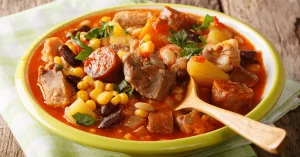A growing focus on nutrition and healthy eating has led many to explore diverse culinary traditions. Among these, healthy African food options offer a unique blend of flavors and ingredients that promote well-being. African cuisine provides a range of nutritious and flavorful choices that can easily be integrated into a balanced diet. By embracing these dishes, individuals can enjoy not only the health benefits but also the rich cultural heritage behind each meal.
Healthy African food options include a variety of nutrient-dense dishes that focus on fresh vegetables, lean proteins, and whole grains. A traditional example is jollof rice, made with tomatoes, onions, and bell peppers, often served with grilled chicken or fish, providing a balance of carbohydrates and protein. Additionally, vegetable stews like edikang ikong from Nigeria, made with spinach, pumpkin leaves, and lean meat, are packed with vitamins and minerals.
Another healthy option is injera, an Ethiopian sourdough flatbread made from teff flour, rich in fiber and essential amino acids. It’s typically paired with a variety of stews and salads, such as shiro (a chickpea-based stew) or mesir wot (spicy lentils). These dishes offer a wholesome combination of plant-based proteins, fiber, and healthy fats, making them both satisfying and nutritious.
The health benefits of African foods.
African foods are rich in essential nutrients and have been part of traditional diets for centuries, contributing to overall health and wellness. Below are the health benefits of key African foods:
- Millets (e.g., Pearl Millet, Finger Millet)
- High in Fiber: Millets are rich in dietary fiber, which aids in digestion, prevents constipation, and supports heart health by lowering cholesterol levels.
- Gluten-Free: A great alternative for those with gluten sensitivities or celiac disease.
- Rich in Micronutrients: They are packed with essential minerals like magnesium, iron, and calcium, which contribute to bone health and prevent anemia.
- Cassava
- Excellent Source of Carbohydrates: Cassava is a high-energy food that is rich in complex carbohydrates, making it a staple for providing energy.
- Rich in Vitamin C: It boosts the immune system, promotes healthy skin, and aids in collagen production.
- Supports Digestive Health: Cassava’s high fiber content contributes to gut health and regular bowel movements.
- Baobab
- Rich in Antioxidants: Baobab fruit has high levels of vitamin C and other antioxidants that help neutralize free radicals, improving skin health and protecting against chronic diseases.
- Supports Immune Function: Its vitamin C content enhances the immune system, protecting against infections.
- High in Fiber: This helps in improving digestion and reducing the risk of gastrointestinal issues.
- African Sweet Potatoes
- Loaded with Beta-Carotene: A great source of vitamin A, which is essential for vision health, skin health, and immune function.
- Rich in Antioxidants: These help in combating inflammation and protecting against oxidative stress.
- Promotes Digestive Health: The high fiber content helps regulate digestion and prevent constipation.
- Moringa
- Packed with Nutrients: Moringa leaves are rich in vitamins A, C, and E, which support immune function and skin health.
- Anti-inflammatory Properties: It contains compounds that help reduce inflammation, which is beneficial for those with conditions like arthritis.
- Rich in Protein: Moringa is an excellent plant-based source of protein, especially for vegetarians and vegans.
- Fonio
- High in Amino Acids: Fonio is a complete protein, containing all nine essential amino acids necessary for muscle growth and repair.
- Low Glycemic Index: This makes fonio a good food choice for those managing blood sugar levels or diabetes.
- Rich in Iron and Magnesium: It promotes red blood cell production and supports nerve and muscle function.
- Okra
- Supports Heart Health: Okra is high in soluble fiber, which helps reduce cholesterol levels and lowers the risk of heart disease.
- Rich in Vitamin K: This vitamin plays a key role in blood clotting and bone health.
- Promotes Healthy Digestion: The mucilage in okra acts as a natural laxative, improving digestion and preventing constipation.
- Teff
- Gluten-Free: Teff is naturally gluten-free, making it an ideal choice for people with gluten sensitivity or celiac disease.
- High in Calcium: It supports strong bones and helps prevent osteoporosis.
- Rich in Iron: Teff helps in preventing iron-deficiency anemia by promoting healthy red blood cell production.
- Tigernuts (Chufa)
- Rich in Fiber: Tigernuts support digestive health and help in maintaining healthy blood sugar levels.
- High in Unsaturated Fats: They contain monounsaturated fats that promote heart health and lower the risk of heart disease.
- Rich in Vitamin E: This vitamin supports skin health and protects against oxidative damage.
- Amaranth
- High in Plant-Based Protein: Amaranth is a complete protein source, making it ideal for vegetarians and vegans.
- Rich in Magnesium: It supports muscle and nerve function and helps regulate blood pressure.
- Anti-inflammatory: Its compounds help reduce inflammation, which is beneficial for individuals with chronic conditions.
- Coconut
- Rich in Healthy Fats: Coconut, particularly its oil, contains medium-chain triglycerides (MCTs) that promote heart health and support weight loss.
- Boosts Immune System: The lauric acid in coconut has antimicrobial properties, boosting the body’s ability to fight infections.
- Supports Skin Health: Coconut oil is often used to hydrate and protect the skin from environmental damage.
- African Leafy Greens (e.g., Amaranth, Jute Leaves)
- Rich in Vitamins and Minerals: These greens are packed with vitamins A, C, and K, essential for immunity, vision, and bone health.
- High in Antioxidants: They help fight oxidative stress, reducing the risk of chronic diseases like cancer.
- Promote Detoxification: They support the body’s natural detox processes and improve liver function.
- Citrus Fruits (e.g., Oranges, Lemons, and Lime)
- Boost Immune Health: High levels of vitamin C support immune function and skin health.
- Aid Digestion: The citric acid in citrus fruits stimulates digestive enzymes and promotes better digestion.
- Rich in Fiber: This helps maintain a healthy digestive system and regulate bowel movements.
- Plantains
- High in Potassium: Plantains are rich in potassium, which helps maintain healthy blood pressure and supports muscle function.
- Rich in Vitamin A: Helps in maintaining healthy vision, skin, and immune function.
- Supports Digestive Health: The fiber content in plantains aids digestion and helps prevent constipation.
- African Honey
- Natural Sweetener: Unlike refined sugars, African honey has a low glycemic index, making it a healthier alternative for those with diabetes.
- Antibacterial Properties: It has natural antibacterial properties, making it effective for soothing sore throats and wounds.
- Rich in Antioxidants: It helps protect cells from oxidative damage, reducing the risk of chronic diseases.
African foods are not only delicious but also highly nutritious, offering a wide array of health benefits ranging from improved digestion and immunity to heart health and anti-inflammatory properties. Incorporating these foods into your diet can significantly enhance overall well-being.
Top 10 Healthy African Foods
Africa is home to a rich variety of foods that are not only delicious but also packed with nutrients. Here are ten healthy African foods that stand out for their health benefits and cultural significance.
- Jollof Rice (West Africa)
Made with rice, tomatoes, onions, and a mix of spices, Jollof rice is a nutrient-dense dish. It is often accompanied by vegetables and lean proteins like chicken or fish, making it a balanced meal. - Injera and Wat (Ethiopia)
Injera, a sourdough flatbread made from teff flour, is rich in iron and fiber. It is often served with wat, a stew made from lentils, chicken, or beef, providing a blend of complex carbohydrates and protein. - Ugali (East Africa)
This maize-based porridge is a staple in many East African countries. When paired with leafy greens like sukuma wiki (collard greens) or fish, it becomes a wholesome, energy-boosting meal. - Fufu and Egusi Soup (West Africa)
Fufu, made from pounded yam, cassava, or plantains, is a great source of carbohydrates. When paired with egusi soup, made from melon seeds, spinach, and spices, it offers a nutrient-rich, filling dish. - Moroccan Tagine (North Africa)
This slow-cooked stew combines vegetables, legumes, and lean meats or fish, flavored with spices like turmeric and cumin. It is a low-fat, high-nutrient meal ideal for maintaining heart health. - Kachumbari (East Africa)
A fresh salad made with tomatoes, onions, and coriander, kachumbari is light and full of vitamins. It is often eaten as a side dish to grilled meat or fish. - Baobab Fruit
Known as the “superfood of Africa,” baobab fruit is rich in vitamin C, antioxidants, and fiber. It can be eaten raw, added to smoothies, or used in baking. - Nsima (Southern Africa)
Made from ground maize, nsima is similar to ugali and is typically served with fish and greens. It provides sustained energy and is a staple for many communities. - Grilled Tilapia (Across Africa)
Tilapia is a lean source of protein that is often grilled and served with sides like plantains, vegetables, or salads. Its omega-3 fatty acids contribute to heart health. - Beans and Corn Porridge (Githeri)
A popular Kenyan dish, githeri combines boiled beans and maize. It is rich in protein, fiber, and complex carbohydrates, making it a hearty and healthy meal.
African cuisine offers an incredible variety of nutritious dishes that promote health and well-being. By incorporating these foods into your diet, you can enjoy delicious flavors while nourishing your body.
The Importance of Whole Grains in African Diets
Whole grains play a crucial role in African diets, providing essential nutrients and supporting overall health. They are unrefined, meaning they retain the bran, germ, and endosperm, which are rich in fiber, vitamins, and minerals. Across the continent, whole grains like sorghum, millet, teff, and maize are integral to traditional dishes and have sustained communities for generations.
- Nutritional Benefits: Whole grains are packed with dietary fiber, which aids digestion and helps regulate blood sugar levels. They are also rich in essential nutrients like B vitamins, iron, magnesium, and antioxidants, which support energy production and immune function.
- Sustained Energy: African whole grains provide complex carbohydrates, offering a steady release of energy. This makes them ideal for people engaged in physically demanding work or long periods of fasting.
- Cultural Significance: Many African staples, such as injera (Ethiopia), sadza (Zimbabwe), and sorghum porridge (West Africa), are made from whole grains. These dishes reflect the continent’s rich culinary traditions and connect people to their heritage.
- Affordable and Accessible: Whole grains are often locally grown and widely available, making them an affordable source of nutrition for many households across Africa.
- Health Benefits: Regular consumption of whole grains can lower the risk of chronic diseases such as heart disease, type 2 diabetes, and certain cancers. Their high fiber content also promotes a healthy gut microbiome.
Incorporating whole grains into African diets ensures nutritional diversity and sustains cultural traditions. By celebrating these grains, communities can enjoy their health benefits while preserving their culinary heritage.
Tips for sourcing authentic African ingredients locally
Finding authentic African ingredients can be challenging but rewarding, as these ingredients bring unique flavors and cultural depth to dishes. Here are some tips to help you source them locally:
- Visit African Grocery Stores
Look for specialty African grocery stores in your area. These stores often stock items like yams, plantains, fufu flour, palm oil, and spices such as uziza, egusi, or berbere. - Explore Farmers’ Markets
Farmers’ markets often have vendors selling fresh produce like cassava, okra, collard greens, and other staples used in African cooking. Establishing relationships with these vendors can also help you access seasonal ingredients. - Check Ethnic Sections in Supermarkets
Many large supermarkets have an international or ethnic food section. You may find ingredients like coconut milk, dried fish, pounded yam flour, or African spices there. - Join Local African Communities
Engage with local African communities or cultural groups. They often know where to source authentic ingredients and may even organize group orders or markets. - Look for Online Retailers
Several online stores specialize in African ingredients and deliver to local areas. Look for reputable websites with customer reviews to ensure quality. - Grow Your Own
If you have the space, consider growing your own ingredients, such as peppers, collard greens, or herbs like basil and thyme, commonly used in African cuisines. - Visit Caribbean or Asian Stores
Some ingredients like plantains, yams, and certain spices are also common in Caribbean and Asian stores. These can serve as alternative sources when African stores are not nearby. - Ask for Substitutes
If a specific ingredient is unavailable, research or ask for substitutes that mimic the flavor or texture of the original item. For instance, kale can replace traditional African leafy greens like sukuma wiki. - Join Social Media Groups
Online forums, social media groups, and blogs focused on African cuisine often share resources and tips for sourcing ingredients in various locations. - Attend African Festivals or Events
African cultural events often feature food stalls or vendors selling authentic ingredients. These gatherings are a great way to stock up and learn more about their uses.
With a little effort and creativity, you can source authentic African ingredients locally to bring the vibrant tastes of Africa to your kitchen.
Ways to make African foods healthier
African cuisine is rich in flavors and nutrients, but with a few modifications, you can make traditional dishes even healthier. Here are some practical ways to improve the nutritional value of African foods while preserving their taste and cultural significance:
- Use Healthier Cooking Oils
Traditional African cooking often involves oils like palm oil or groundnut oil, which can be high in saturated fats. Opt for healthier oils, such as olive oil, avocado oil, or coconut oil, which provide healthier fats and antioxidants. - Incorporate More Vegetables
Many African dishes, such as stews and soups, can benefit from adding more vegetables like spinach, kale, carrots, or bell peppers. This increases the fiber content and provides additional vitamins and minerals. - Choose Lean Protein Sources
Instead of relying heavily on red meats or fatty cuts of meat, try using lean protein sources like chicken, fish (especially oily fish like tilapia or sardines), beans, lentils, and tofu. These options are lower in fat and offer high-quality protein. - Limit Salt and Use Spices
Many traditional African dishes rely on high levels of salt for seasoning. Reducing the amount of salt can lower sodium intake, which is beneficial for heart health. Enhance flavor with a variety of spices such as garlic, ginger, turmeric, cumin, and cinnamon, which also offer health benefits. - Go for Whole Grains
Many African foods are made with refined grains like white rice or white flour. Opt for whole grains like brown rice, millet, quinoa, or teff, which are richer in fiber, antioxidants, and essential nutrients. - Reduce Fats in Fried Dishes
Frying is a common cooking method in many African cuisines, but it can add unhealthy fats and extra calories. Instead, try grilling, steaming, baking, or sautéing dishes to reduce the amount of oil used. - Control Portion Sizes
African meals can be large and calorie-dense. Reducing portion sizes, particularly for starchy foods like fufu, ugali, or rice, and balancing them with plenty of vegetables and lean proteins, can help manage calorie intake. - Embrace Fermented Foods
Fermented foods like injera (Ethiopia), ogi (Nigeria), and sour cassava provide beneficial probiotics for gut health. Incorporating more fermented foods into the diet can support digestion and boost immune function. - Incorporate Legumes and Pulses
Legumes like beans, lentils, chickpeas, and peas are staples in African diets. These plant-based proteins are rich in fiber, iron, and antioxidants. Include them more often in stews, salads, and sides. - Add More Fruits
Fruits like mangoes, papayas, guavas, and baobab are not only delicious but also packed with vitamins, fiber, and antioxidants. Adding fresh fruits as snacks or dessert can provide extra nutrients without added sugars.
By making these small adjustments, African meals can become even more nutritious while retaining their authentic flavors and cultural significance.
Conclusion
Healthy African food options offer a diverse range of nutrient-rich dishes that can support a balanced diet. From vibrant vegetables and whole grains to lean proteins like fish and legumes, these foods are packed with essential vitamins and minerals. By incorporating healthy African food options into your meals, you can enjoy delicious, wholesome flavors while boosting your overall well-being. Embracing traditional African cuisine not only provides a taste of culture but also promotes a healthier lifestyle.




